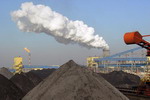Media lash out at ConocoPhillips
Updated: 2011-09-06 10:25
(Xinhua)
|
|||||||||||
BEIJING - So-called "crisis management" skills that ConocoPhillips China has used after recent oil spills in north China's Bohai Sea do not help the company, and it may unintentionally harm itself by resorting to such tactics, said a People's Daily article published Sept 5.
"China's maritime authority finally stopped ConocoPhillips China's oil field operations after ongoing delays, negligence, cover-ups and cheating (by the company)," said the article in the flagship newspaper of the Communist Party of China.
ConocoPhillips China (COPC), a wholly-owned subsidiary of the Houston-headquartered oil giant ConocoPhillips, has complied with a suspension order, said a statement on the company's website.
The suspension order issued by the State Oceanic Administration (SOA) came Sept 2 after COPC failed to meet the SOA's order to find potential oil spill sources and seal existing oil leaks before Aug 31.
As the operator of the leaking Penglai 19-3 oil field in the Bohai Bay, COPC has been blamed for oil leaks on June 4 and June 17 that resulted in approximately 700 barrels of oil escaping into the Bay and 2,500 barrels of mineral oil-based drilling mud flowing onto the seabed.
On Aug 31 the company submitted a report to the SOA claiming that all the oil spills had been cleaned up.
Public condemnation of COPC's poor handling of the crisis strengthened after a China Central Television (CCTV) report revealed on Friday that, during a conversation between a CCTV reporter and an anonymous COPC employee, someone told the reporter via the ship's intercom system that the company intentionally set out to deceive Chinese authorities when it announced that it had met the SOA's requirements.
The company denied that its employee made the remarks and demanded a correction from CCTV, saying anyone in that sea area could make comments or interrupt any conversations on that wireless intercom channel that is open to the public.
"There is a sharp contrast between the company's sensitivity regarding its image and its inadvertence towards China's oceanic environment," said the article.
The article stated that, using modern detection analysis techniques, it would be easy to judge whether the voice from the intercom belongs to a company employee, but "isn't it too serious for the company to fuss about such details, instead of addressing the problem that has lasted for three months?"
However, COPC used its crisis management skills quite well: it covered up the incident for as long as possible, it lied in July by saying that the spills had been "basically cleaned up," and, on the day of the clean-up deadline, it claimed that all leaks had been "completely blocked," the newspaper said.
After the lie was exposed, COPC said that the delay was caused by "unsound weather conditions," it said.
According to the SOA investigation, the oil spill was an "inferior mistake" caused by substandard operations.
The oil spills have spread to beaches in Hebei and Liaoning provinces. The spills have also been blamed for losses in the provinces' tourism and aquatic farming industries.
"In the face of spreading oceanic pollution and fishermen's losses, it is both a legal and just requirement for the company to shoulder responsibility, regardless of its wealth value and crisis management skills," it said.
According to the company's website, ConocoPhillips holds a 49 percent interest in the Penglai 19-3 field which represents approximately 3 percent of the company's total annual production.
The integrated energy company had about 29,900 employees, $160 billion of assets, and $244 billion of annualized revenues as of June 30, according to the website.
China National Offshore Oil Corp (CNOOC), which has a 51 percent stake of the Penglai 19-3 oilfield but is not the operator, said late?Sept 3?it will enhance supervision and assistance to COPC in handling the oil spills to make sure that it fully implements maritime authority's requirements, despite that the suspension will further reduce CNOOC's net production by about 40,000 barrels per day.
China's online community has condemned COPC for its negligence. Internet users have suggested that authorities take into consideration the amount of compensation BP must pay for last year's catastrophic oil spill in the Gulf of Mexico when fining COPC.
By Aug 23, BP had paid out more than $5 billion to victims of last year's massive Gulf of Mexico oil spill, according to the fund administrator. The payouts amount to roughly 25 percent of the $20 billion fund, known as the Gulf Coast Claims Facility, set up following the April 2010 spill.
He Yu'ang, a blogger at sina.com, said the way COPC had acted was due to China's inadequate maritime laws and regulations, and the amount the company could be fined was too small so it chose to neglect the country's oceanic environment.
It is high time for the country to change the situation of "high cost of law-abiding but low cost of law violations," said Fan Zhengwei, a commentator with the People's Daily.
Yang Hua, CNOOC's general manager, said the company is drafting a plan to establish a maritime eco-fund.
Related Stories
ConocoPhillips ordered to stop drilling 2011-09-03 07:52
ConocoPhillips China's oil clean-up unsatisfactory: SOA 2011-09-02 19:24
ConocoPhillips urged to clean up oil spills 2011-08-25 23:00
ConocoPhillips vows to clean up oil spills 2011-08-24 19:18
- Coca-Cola to spur per capita sales in China
- Production shut down in Bohai
- China Vanke sales fall 12.6% in Aug
- Rare earth mines in E China to halt output
- August CPI likely to show slower rate of inflation
- New agency to challenge 'big three'
- Banks to mop up more liquidity
- Cities to test vehicle power pricing













